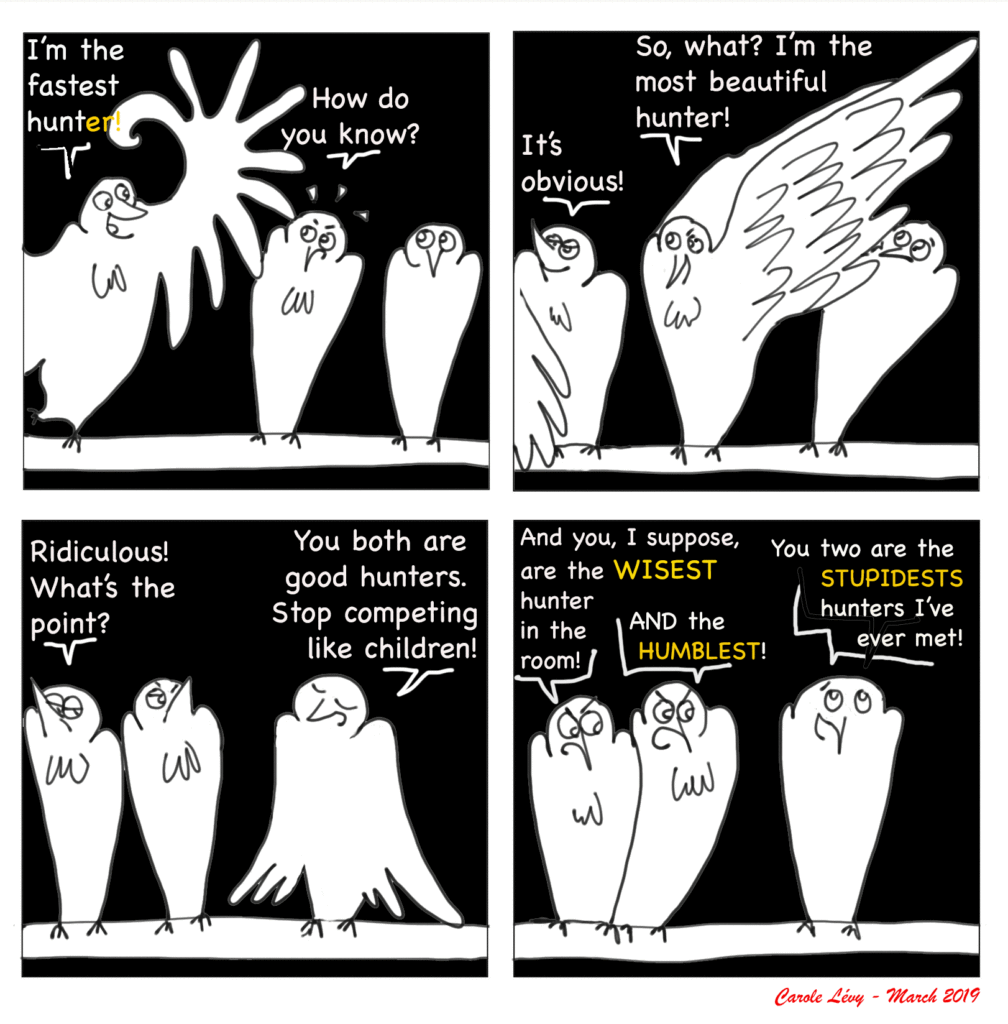
By my standards, it’s not okay to say that I want to be the best. This would be arrogant and egotistical. But it’s okay to say that I want to be my best self.
At the risk of repeating myself (click here), there is a fine line between the two, and a significant difference.
Being my best self has the purpose of learning, fulfilling my potential and giving back to others. Being the best has the purpose of outshining others and reassuring the relentless sense of deficiency of my ego by being better than to make sure I’m not less.
When my best self meets others, she is excited for everyone to fulfill their potential and talents. Sometimes she even wants others’ fulfillment more than her own
When striving to be the best meets others, she doesn’t care as much about others fulfilling their potential and talents as she does about them admiring her. And if others don’t fulfill anything, even better. More room in the kitchen.
Consciously or unconsciously, we constantly cross the line between being our best self and being the best, to the point where we often don’t have a clue about which paradigm we are existing in.
Personally, if I stay too long in the paradigm of wanting to be the best– it can manifest as wanting to be the wisest in the room – I start to get anxious, impatient, judgmental, righteous, a poor listener, self-absorbed, controlling, disengaged, insecure, depressed or preachy. Then, it’s just a matter of time before I become the stupidest in the room, feeling alone and disconnected.
Simply said, I am my best self when I’m connected to others, and at the service of a purpose.
No more, no less.
Reflective question: Do you recognize the difference between wanting to be your best self and wanting to be the best? What purpose helps you to be your best self?








When I want to be the best, the outcomes are very self centered. I envision being hoisted on the pedestal, recognized by many peers, revel in a sea of self absorption, my sacrifice, my effort, my insight, my time. I strive toward perfection or exploiting others weaknesses. The world is a zero sum place. Rejecting criticism defensively or sarcastically. Time and deadlines are obstacles.
When I want to be my best self, the focus shifts. I’m more process oriented. There’s space to acknowledge and accept my weaknesses and yet still focus on good outcomes. I’m driven to learn, listen, empathize. Be open to suggestions. Recognize the contributions of others. Look for more win/win scenarios. Despite not being the best, recognize the opportunities for takeaways. Accepting criticism constructively. Time is an asset.
In my opinion, each mindset has an appropriate time and place but being my best self takes more intention. I default much easier towards being the best.
Wow, you’re very clear! As usual, you are extra-honest and don’t “BS” yourself (and others). Thanks Bill!
Great post! This distinction between being “the best” and being “my best” is such a wonderful insight and seems as profound to me as Dweck’s fixed vs growth mindset concept. In the end, I think that people will be happier when striving to be the latter.
I think that there are some caveats though… The other night, I checked in with my 12 year old daughter to see whether she had finished her math homework. Her response was that she had completed it “to the best of her ability.” Now this didn’t really pass the smell test with me, and sure enough her homework wasn’t complete. While her response sounded sounds like a very health perspective that she had done her own personal best, I knew that she did not push herself beyond her comfort zone. What pushes people past their comfort zones? Can we all agree this is necessary to do in order to reach our personal bests?
While doing one’s personal best is the healthiest perspective, I wonder whether our children are figuring out that they can use these healthy and evolved concepts as a crutch that will ultimately lead them to not achieve their own personal best. It would be great if we can teach them to do so in the name of personal growth and not ego aggrandizement. Any tips on how to do so?
Hi Ron, Thanks for your thoughtful comment – I love the answer of your daughter (smart girl!). You probably have already done a good job as a parent. I also love your reflection about how we teach our children to stretch the boundaries of their comfort zones without wanting to be perfect or the best. Sorry, i don’t have tips, but I appreciate the question!
Hi Carole
Great post and great accompanying images. This one really hit the mark with me!
I like and agree with your distinction between being the best and being my best self. And….when I am being my best self: with attention to intention, willingness to be vulnerable, openness to learning what is uncomfortable, wanting others to fulfill their potential….this state is also challenging and stressful for me. So perhaps I’m too close to that fine line and keep flipping into the self-judgments and drivers related to being the best.
Keep up your posts…They are very welcome.
Jackie